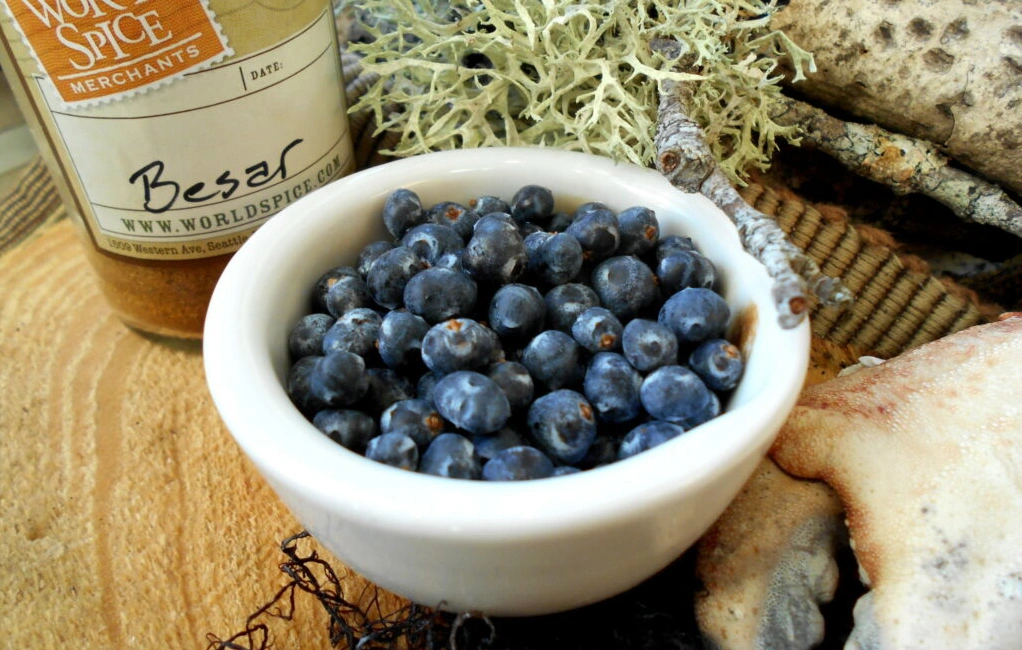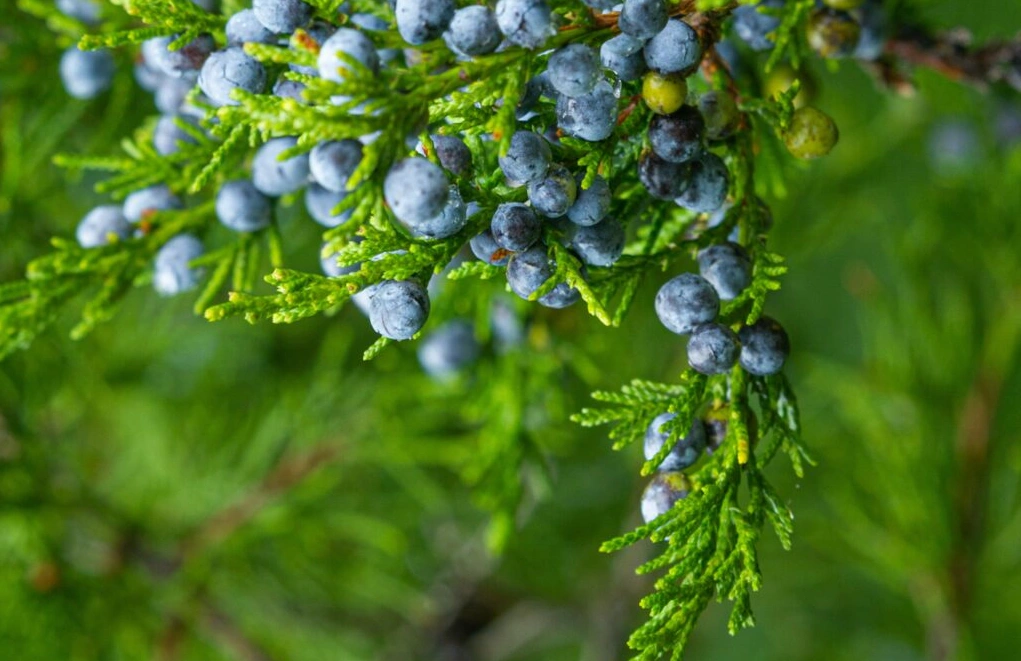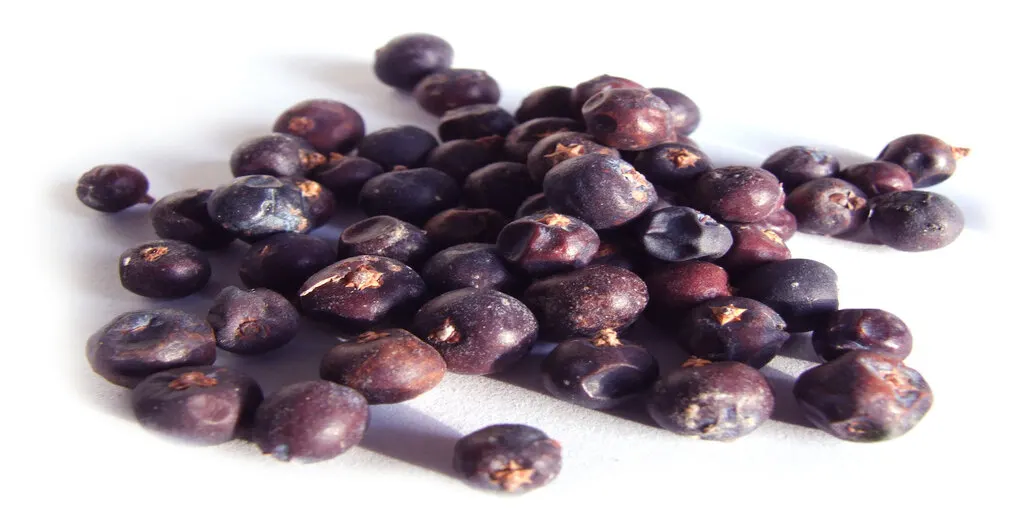Are You Supposed To Eat Juniper Berries?
If you’re wondering whether you can eat juniper berries, the answer is yes, but with some caution.
Juniper berries are a common ingredient in many dishes and beverages, including gin, sauerkraut, and game meat.
How do you know if juniper berries are safe?
It’s essential to make sure you’re consuming the right type of juniper berries as not all species are safe for human consumption.
Therefore, it’s crucial to identify and source your juniper berries from a reputable supplier or harvest them yourself if you know how.
Also, ensure the berries are ripe and have a blueish color before eating.
Are some juniper berries poisonous?
Yes, some types of juniper produce berries that contain toxic compounds that can cause severe health issues or even death when ingested.
Therefore, it’s essential to know which type of juniper produces edible or non-edible berries.
Are juniper berries safe for humans?
Edible species of the juniper tree produce fine quality, flavorful fruit that has been used for centuries in traditional medicine and cuisine.
However, excessive consumption can cause adverse effects; hence they should be consumed moderately.
How do you consume juniper berries?
The most common way of consuming junipers is by adding them as flavoring agents in dishes such as sauces or using them to make beverages such as teas or gin.
What do juniper berries cure?
Junipers are believed to have medicinal properties that help treat several ailments like diarrhea, arthritis, and bladder infections.
In conclusion, although it’s okay to eat junipers in moderation with caution governing its use helps assure its safety.

How Do You Know If Juniper Berries Are Safe?
Juniper berries have been used for medicinal and culinary purposes for centuries.
Before consuming juniper berries, it is important to ensure that they are safe to eat.
Here are a few things to consider:
Source of Juniper Berries
The source of the juniper berries greatly determines their safety.
Juniper berries from reputable sources such as grocery stores or herbal shops have been tested and passed food safety standards.
Avoid eating wild juniper berries, as they may have been contaminated with pesticides or other harmful substances.
Species of Juniper
There are over 70 species of junipers with varying levels of toxicity.
Some species produce poisonous berries and leaves that should not be consumed under any circumstances.
Look out for common edible species such as the common juniper (Juniperus communis) or the California juniper (Juniperus californica).
Amount of Consumption
Judicious consumption of juniper berries is recommended as excessive consumption may cause adverse reactions such as gastrointestinal issues or kidney problems.
Also, pregnant women should avoid consuming juniper berry as it may trigger uterine contractions.
To conclude, while juniper berries have numerous benefits, ensuring their safety before consumption is necessary.
Consider their source, species, and amount before adding them to your diet.
Are Some Juniper Berries Poisonous?
While juniper berries are safe for human consumption, some species of juniper may produce poisonous berries.
It is important to know which type of juniper you are consuming before eating the berries.
Poisonous Juniper Berries
The following species of juniper are known to produce toxic berries:
- Common Juniper: This is the most commonly found juniper species and it produces edible berries.
- However, some individuals may experience an upset stomach or allergic reactions after consuming them.
- Pfitzer’s Juniper: The Pfitzer’s juniper produces toxic berries that can cause vomiting, diarrhea and abdominal cramps when consumed in large amounts.
- Savin Juniper: The savin juniper is known for producing poisonous berries.
- Consuming the berries can be fatal to humans and livestock.
Identifying Poisonous Junipers
To identify whether a juniper berry is safe for consumption or not, you need to determine which species it belongs to.
Here are some physical features that can help you distinguish between different species:
- Foliage: The needles of the common juniper are short and pointed while those of the savin and Pfitzer’s junipers are longer and feathery-looking.
- Berries: The common juniper produces bluish-black, pea-sized berries that have a waxy surface.
- Pfitzer’s juniper has small blue-black berries clustered at the tips of its branches while savin produces black-blueish fruits with a powdery bloom on their surface.
Berry Consumption
If you plan on consuming juniper berries, it is recommended that you stick with commercial products that have been approved for human consumption rather than harvesting and eating wild ones.
Additionally, make sure that you only consume edible species of junipers.
If you accidentally consume poisonous berries, seek medical attention immediately.
Symptoms of poisoning include nausea, vomiting, diarrhea, seizures, abdominal pain and difficulty breathing.
Note: Please make sure to consult your doctor before adding any new food items or herbs into your diet especially if you have any underlying health conditions.
Are Juniper Berries Safe For Humans?
Juniper berries have been used for medicinal purposes and as a spice in cooking for centuries.
While some species of juniper produce berries that are toxic to humans, many others have edible berries that are safe when consumed in moderation.
What to watch out for
It’s important to be aware of the differences between edible and toxic juniper species.
Some species, such as the common juniper (Juniperus communis) and the California juniper (Juniperus californica), produce edible berries that can be safely consumed by humans.
However, other species like Juniperus sabina and Juniperus oxycedrus contain toxic compounds such as thujone and should not be consumed.
Suggested dosage
While juniper berries are generally safe for human consumption in small quantities, consuming large amounts can have negative effects on your health.
The suggested dosage is about one teaspoon of crushed juniper berries per day, which can be mixed with food or consumed as tea.
Possible side effects
In some cases, consuming juniper berries in excess or without proper guidance from a healthcare professional can cause adverse side effects such as upset stomach, diarrhea, and allergic reactions.
Pregnant women should also avoid consuming large amounts of juniper berries as it has been linked to uterine contractions.
The bottom line
Juniper berriers are generally safe for human consumption when taken in moderation.
It’s important to differentiate between different species of junipers and consume only the edible ones while avoiding those that contain toxic compounds.
How Do You Consume Juniper Berries?
Juniper berries are a popular choice in different world cuisines for adding flavor and aroma to dishes.
There are various ways to consume juniper berries such as:
Cooking with Juniper Berries
Juniper berries can be used in various recipes such as game meat, pickles, and marinades.
To use juniper berries in cooking, crush them lightly or grind them into a powder.
Then, add them directly to the food while cooking or steep them in water (like tea) and use the liquid for cooking.
Making Tea with Juniper Berries
You can make tea with dried juniper berries by simply steeping 1-2 teaspoons of crushed or powdered juniper berries per cup of hot water for 10-15 minutes.
You can also mix it with other herbs like ginger or chamomile to enhance its flavor.
Using Juniper Berries for Gin
Juniper berries are also used as one of the main ingredients in the production of gin.
They give gin its distinct flavor and aroma.
However, consuming gin should be done in moderation.
Taking Juniper Berry Supplements
Juniper berry supplements are available in capsule form usually used to treat digestive problems and urinary tract infections.
Always consult with a health practitioner before taking any dietary supplements.
It is important to note that while juniper berries have some health benefits they should always be consumed in moderation as overconsumption can lead to adverse side effects such as stomach irritation, nausea, vomiting, or diarrhea.
People with underlying medical conditions should consult their health practitioners before consuming any amount of juniper berry.
In conclusion, there are many ways you can consume juniper berries ranging from cooking to gin-making and herbal supplements but it’s important always to use it moderately and safely.

What Do Juniper Berries Cure?
Juniper berries are known to have various health benefits.
Some of the curative properties of juniper berries are mentioned below:
Urinary tract infections
Juniper berries have been used for centuries to treat urinary tract infections (UTIs).
It has antiseptic and antibacterial properties that help fight off harmful bacteria in the urinary tract.
The berries also have diuretic properties which helps flush out bacteria and other toxins from the body.
Arthritis
Juniper berries have anti-inflammatory properties, which makes them useful in managing arthritis pain.
They contain compounds that reduce swelling and inflammation in the joints, providing relief from arthritis symptoms.
Digestive Issues
The essential oils found in juniper berries can stimulate the digestive system, promoting healthy digestion.
It can also provide relief from symptoms such as bloating, gas, and constipation.
Respiratory Problems
Drinking juniper berry tea or inhaling steam infused with juniper essential oil can help alleviate respiratory problems like coughs and colds.
Juniper has expectorant properties that help loosen phlegm and mucus, making it easier for you to breathe.
Skin Issues
Juniper berries contain antioxidants that are beneficial for skin health.
They can help reduce oxidative stress and prevent premature aging of the skin.
Additionally, applying crushed or blended juniper berries topically can help relieve acne and other skin irritations.
It is important to note that while juniper berries have many health benefits, they should not be considered a replacement for medical treatment.
Always consult with your doctor before using juniper as a remedy for any ailment or condition.
What Do Raw Juniper Berries Taste Like?
Raw juniper berries are not typically consumed as a standalone food item but are rather used as a seasoning in a variety of dishes.
They have a distinctly piney flavor with herbal and slightly fruity notes.
The taste of raw juniper berries can be quite bitter, so it is often suggested to use them in moderation.
Juniper Berries in Cuisine:
The unique flavors of juniper berries make them popular in various cuisines around the world.
In Scandinavian cooking, they are used to flavor game meats and cured fish.
In Europe, they are added to sauerkraut and pickled vegetables.
Additionally, juniper berries are used in the production of gin, where their flavor is infused into the alcohol.
Pairing Juniper Berries:
Juniper berries pair well with rich meats like venison, duck, and lamb.
They can also be used to enhance the flavors of root vegetables like carrots, potatoes, and parsnips.
It is crucial to use juniper berries sparingly as they have a strong taste that can easily overpower other ingredients.
Conclusion
In summary, raw juniper berries have a distinctive piney taste with herbal and fruity notes.
They are primarily used as a seasoning in various dishes worldwide due to their unique flavor profile.
When using juniper berries in cuisine, it’s essential to utilize them sparingly as they can quickly overwhelm other ingredients if overused.
What Are The Side Effects Of Juniper Berry?
Juniper berries are known to have properties that can improve digestion, boost immunity, and treat various ailments.
However, they may also cause some side effects in some people.
Here are some common side effects of juniper berry:
Diarrhea
Consuming large amounts of juniper berries may lead to diarrhea due to their diuretic properties.
Juniper berries contain compounds that increase urine production and help flush out toxins from the body.
However, excessive consumption may cause dehydration and digestive discomfort.
Gastrointestinal Distress
Juniper berries have a strong flavor that can irritate the stomach lining in some people, leading to nausea, vomiting, or abdominal pain.
These symptoms usually subside within a few hours and do not require medical attention.
Allergic Reaction
Some people may be allergic to juniper berries and develop symptoms such as rash, itching, or swelling after consuming them.
It is important to seek medical attention if you experience any of these symptoms.
Drug Interactions
Juniper berries may interact with certain medications such as diuretics or blood thinners and cause adverse reactions.
If you are taking prescription medication, it is best to consult your doctor before consuming juniper berries.
In conclusion, while juniper berries offer many health benefits, they may also cause side effects in some individuals.
It is important to consume them in moderation and seek medical attention if you experience any adverse reactions.

What Type Of Juniper Has Edible Berries?
Juniper berries are the fruit produced by the common juniper tree, also known as Juniperus communis.
This tree is a member of the cypress family and is native to many regions around the world, including Europe, Asia, and North America.
Edible Juniper Berries
Not all species of juniper have edible berries.
Only a few of them are safe for human consumption.
Here are some types of junipers that have edible berries:
- Common Juniper (Juniperus communis): This is the most widely recognized type of juniper and produces small and purplish-blue berries that can be used in culinary dishes.
- Siberian Juniper (Juniperus sibirica): This variety of juniper also produces slightly larger blue-purple berries that are safe to eat.
- Pfitzer’s Juniper (Juniperus chinensis ‘Pfitzeriana’): This ornamental shrub produces small, dark blue-black berries that can also be used for food purposes.
Inedible or Poisonous Juniper Berries
Ingesting certain types of junipers could result in stomach cramps, vomiting or diarrhea.
Here are some types of junipers that produce inedible or poisonous berries:
- Mexican Juniper (Juniperus mexicana): The Mexican Juniper has inedible orangish-brown berry-like cones.
- Cedar Berry (Juniperus monosperma): Although Cedar Berries look like a type of blueberry, they have been known to cause digestive issues and should not be consumed by humans.
- But it can be used as an herbal treatment for many ailments such as blood circulation issues among others.
- Chinese Junipers (Sabina spp.): Avoid eating this type because their toxic properties could lead to seizures, respiratory failure or even death especially when eaten in large amounts.
The Bottom Line
If you want to try consuming raw junipers for their health benefits, ensure you’re using only those species with edible berries such as Common Junipers or Siberian Junipers which produce bluish-purple colored fruits.
It’s also important to note that while consuming raw junipers may offer some health benefits, it may not be suitable for everyone.
So if you’re considering using it medicinally or adding it to your diet for taste purposes , talk with a certified nutritionist first who can guide you on how much wildcrafted herbs/berries would suit your body’s needs..
In general, it’s important to always take caution when consuming foods from nature even if they appear safe because safety can never be overemphasized in any situation.
Should You Crush Juniper Berries?
Juniper berries are one of the oldest herbs used for medicinal purposes.
They are a popular flavouring ingredient in various foods and beverages, including gin.
However, when it comes to consuming juniper berries, one question that often arises is whether you should crush them before consuming or not.
The answer
Yes, you can crush juniper berries before consuming them.
In fact, crushing the berries releases their oils, which enhances their flavour and aroma.
Also, crushing the berries is necessary when making teas, tinctures or infusions with them as this helps in extracting the active ingredients from the berry.
How to crush juniper berries?
You can easily crush juniper berries at home using a pestle and mortar.
Put the desired amount of juniper berries into a mortar and grind them with a pestle until you have achieved your desired consistency.
Alternatively, you can use a food processor or coffee grinder to crush the berries.
Benefits of crushing juniper berries
- Enhances taste: Crushing juniper berries intensifies their flavour and aroma.
- Better digestion: Crushing the berries can make digestion easier by breaking down tough fibrous materials.
- Increase absorption: Crushing the berries helps release more nutrients than chewing alone can provide.
Cautions to be aware of
If you have any medical conditions or taking medication consult your doctor before consuming juniper berry as it has been known to interact with certain medications and cause side effects such as stomach problems, rashes or allergic reactions.
Pregnant women should also avoid this herb due to its potential abortifacient properties.
In conclusion, crushing juniper berries does not pose any risk and it’s beneficial in extracting more of its potent substances thus making them more flavorful and nutritious.
Remember always consult a professional health provider for guidance regarding dosage levels and consume only high-quality dried berry products from reputable sources when possible.
Is Diarrhea A Side Effect Of Juniper Berries?
Juniper berries are a flavorful addition to various dishes and are known for their range of health benefits.
However, like with any food or herb, consuming it in large quantities can have side effects.
One such side effect is diarrhea.
Why can juniper berries cause diarrhea?
The primary reason why juniper berries can cause diarrhea is due to their diuretic properties.
These properties can stimulate the digestive system and cause an increase in bowel movements.
This effect can be beneficial for those who suffer from constipation but may lead to diarrhea if consumed excessively.
What is the recommended dosage of juniper berries?
It is recommended not to consume more than 10 grams (around 2 teaspoons) of juniper berries per day, as consuming more than this amount can lead to adverse effects such as diarrhea and stomach cramps.
How can I avoid experiencing diarrhea after consuming juniper berries?
To avoid the side effect of diarrhea from consuming juniper berries, it is important to follow the recommended dosage and not exceed it.
Additionally, it is essential to drink plenty of fluids while consuming them as they have diuretic properties which means they increase fluid loss through urine.
Conclusion
In conclusion, while juniper berries have many health benefits, they should be consumed in moderation to avoid potential side effects like diarrhea.
Drinking plenty of fluids while consuming them will help prevent fluid loss due to their diuretic properties.
It’s always best to consult with a healthcare provider before adding new foods or supplements to your diet.
What Is The Difference Between Juniper And Juniper Berry?
Juniper is a type of evergreen shrub or small tree that belongs to the cypress family.
It can grow up to 40 feet tall, and is commonly found in temperate regions worldwide.
Junipers have needle-like leaves and produce berries that are used in various culinary preparations.
Juniper berries are the fruit of the juniper plant.
The Plant
Juniper plants have a variety of species, including common juniper, creeping juniper, and Chinese juniper.
The plants produce small cones that resemble berries.
The foliage of a juniper plant may be either needle-like or scale-like.
The Berry
Juniper berries are typically blue or black in color, although some species produce red or orange berries as well.
The berries contain essential oils and aromatic compounds that give them their distinctive flavor and scent.
Culinary Uses
Both the plant and the berry are used in cooking and herbal medicine.
Juniper berries are commonly used as a spice for their sweet, resinous flavor.
They’re often used to add flavor to meat dishes such as venison, lamb, and pork.
They can also be used to make gin.
The plant has been used as a medicinal herb for centuries due to its anti-inflammatory, anti-bacterial, and anti-fungal properties.
It’s typically used to treat ailments such as digestive problems, arthritis pain, and urinary tract infections.
Possible Side Effects
While consuming juniper berry is generally considered safe for most people when consumed in reasonable amounts as part of a balanced diet – excessive consumption can lead to various side effects; gastrointestinal issues being one of them.
If you’re thinking about adding juniper berry or any supplements containing it into your daily routine; it is recommended that you consult with your doctor first.
If you experience any adverse health effects after consuming juniper berry; stop taking it immediately and seek medical attention if necessary.
Overall, Junipers have more than forty species – all having distinct characteristics ranging from their size & shape to their aroma & taste qualities.
Sample from each of these diverse species would provide varying flavors for culinary ventures.
Common Junipers which represents half dozen subspecies across two continents are mostly grown commercially for gin production while creeping Junipers (often grown in rock gardens) can be added as an evergreen ground cover or even incorporated into your bonsai garden.
To sum it up perfectly: “The distinction between living plants (junipers)and their dried version(same thing with different texture-berries) is an important one”.

Equipment
- Cozy Mug
- Tea Ball
- Kettle
Ingredients
- 1 teaspoon juniper berries dried
- 1 ½ cups water boiling
Instructions
- Place the dried juniper berries in a big cup with a tea ball (alternatively, put the berries directly in the mug).
- Fill the cup halfway with hot water. Allow for a 15-minute steep. Remove the tea ball or strain the berries.
- Serve plain or with a spoonful of raw honey.
